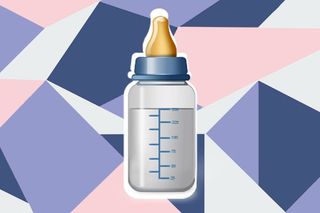
Is Probiotic‑Supplemented Breast Milk the Future?
A study has found it reduces antibiotic resistance in babies.

In the past year, a spate of research has explored how critical the right mix of gut bacteria is to health and how the infant microbiome develops. Critical to both, scientists are finding, is breast milk, which contains molecules that nourish a specific type of gut bacteria, along with substances that nourish the baby. Since then, the question has quickly become how to harness and maximize this power of breast milk.
Scientists who recently presented at the annual European Society for Paediatric Gastroenterology Hepatology and Nutrition think they have found one way to leverage breast milk in the fight against antibiotic resistance (which has recently been linked to changes in the gut microbiome).
Breastfed infants fed a specific probiotic strain of B. infantis had, on average, 87.5% less antibiotic resistance genes in their gut microbiome when compared with breastfed infants who had not received the supplement. Thirty-eight antibiotic resistant genes were reduced in the supplemented infants, including genes associated with resistance to a wide range of drugs prescribed to treat respiratory, intestinal and urinary infections, chlamydia and acne.
Antibiotic resistance has been identified by the World Health Organisation as one of the biggest threats to global health, and the increasing prevalence of antibiotic resistance gene carriage is a growing public health concern. Misuse of antibiotics in humans and animals is accelerating this threat and a growing number of infections are becoming more difficult to treat as antibiotics become less effective. Members of the public frequently take antibiotics when they are not required to, with estimates suggesting that more than half of all the antibiotics taken by humans are not actually needed. Antibiotics are often fed to livestock to boost food production, and resistance can spread ‘vertically’ when new generations inherit antibiotic resistance genes.
Dr Giorgio Casaburi and his team assessed infants who, along with exclusive breastfeeding, received a supplementation of the probiotic for 21 days. After two weeks of supplementation, fecal samples were collected and compared with infants who had exclusively received breast milk, to evaluate the presence of antibiotic resistance genes.
The probiotic utilised in the research is uniquely adapted to thrive in the infant gut and is often missing from the microbiome of infants born in Europe and the US today. In the absence of this protective bacterium, other bacteria colonise the gut microbiome and enable the evolution, persistence and dissemination of antibiotic resistance genes.
“The supplementation offers a novel approach towards providing an alternative, safe and non-invasive method to decrease the number of genes that resist antibiotics in infants,” says Casaburi, the study’s lead author. “This is the first demonstration of significant remodeling of the infant gut microbiome. This modulation could help to reduce the burden and diversity of antibiotic resistance genes in current and future generations.”
It will be a long time before this is an approved course of nourishment for infants — if it ever is — and even longer before such a probiotic cocktail is widely available. But as research increasingly reveals gut bacteria as a, if not the, secret to good health, that long time may be shorter than we think.
Related


I Tried Hypnotherapy to Manage My Daily Stress
